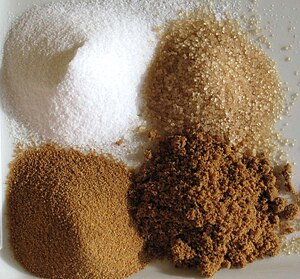
Français : Echantillons de différents sucres, de gauche à droite et de haut en bas : sucre blanc, sucre complet, rapadura, cassonade (Photo credit: Wikipedia)
In small amounts and in its natural state, sugar cane has many nutrients that contribute to good health;
- chromium helps control blood sugar
- manganese is an essential mineral involved in carb and fat metabolism, bone health, sex hormones and helps reduce free radical damage
- cobalt is an essential mineral the is involved in the formation of vitamin B12
- copper and zinc are important to maintain minerals because when deficient can contribute to poor immune system, attention and behavior issues. If you suffer from chronic fatigue and are a vegan or an older adult, please read this, http://www.westonaprice.org/metabolic-disorders/copper-zinc-imbalance.
- magnesium is an important mineral involved in bone and heart health and many more functions in the body, read more here http://ods.od.nih.gov/factsheets/Magnesium-HealthProfessional/
When sugar cane is processed into sugar, it is stripped of its nutritional value. Sugar cane loses 93 percent of its chromium, 89 percent of its manganese, 98 percent of its cobalt, 83 percent of its copper, 98 percent of its zinc, and 98 percent of its magnesium. It is now practically nutrient less. Consuming pure refined sugar may also cause your body to excrete chromium, which, ironically, triggers sugar cravings. This mineral loss is typically what happens in the processing of many convenience foods, including bread.
Sugar, no matter what the source has many names and you may be surprised to find out where it is hidden. Sugars aka, brown sugar, dextrose, fruit juice concentrate, honey, maltodextrin, invert sugar, malt syrup, lactose, maltose and molasses. If you want a laundry list sit down while you go through it, it is quite a long list, http://www.myfitnesspal.com/topics/show/821596-257-names-for-hidden-sugar.
Many convenience foods that do not taste sweet are loaded with added sugars, and many busy people turn to these foods for quick meal options. Consider that peanut butter, jelly, bread, bologna, breakfast bars, granola bars, canned chili, and canned fruit in syrup all contain added sugar; so do fast foods such as pizza, sandwiches, and even breakfast items too. According to the USDA, a fast food cheese and bacon griddle cake sandwich has 9 grams of sugar. Some sweetened breakfast cereals contain as much as 15 grams of sugar per ounce.
Do you think of these foods as being sweet? Just check the label for yourself.
- Grey Poupon
- Pepperidge Farm 100% Natural Whole Wheat bread
- Jif Peanut Butter
- Bush’s Best – light red kidney beans
- Progresso Dark Red Kidney Beans
- Oscar Meyer shaved turkey breast
- Oscar Meyer Ready to Serve Bacon
- Oscar Meyer Hard Salami
- Healthy Choice Split Pea & Ham soup
- Powerbar performance bars
- Aunt Jemima Original Pancake Mix
- Aunt Jemima Whole Wheat Blend Pancake Mix
- Desserts and sweet beverages pile on even more of the sweet stuff. You may also have more sugar in the form of soft drinks, candy, ice cream, cookies and cup cakes.
There is one sweetener, in particular, it is a natural derivative from corn. So seemingly it would NOT be unhealthy but high fructose corn syrup (HFCS) which has been in our foods since the 1970’s is been anything but a healthy alternative. It dominates the “added sugars” market in processed convenience foods. Here’s what you should know, http://www.huffingtonpost.com/dr-mark-hyman/high-fructose-corn-syrup-dangers_b_861913.html.
If you’re active and in good shape, you’ve probably been encouraged to load up on sugary sports drinks, and energy bars, before and after your exercise. Television commercials and programming also urge you to drink “sports drinks” after exercise, to replace the energy you burn. Guess what they contain? Have you read the ingredients? This is how fit people may end up with metabolic health conditions. No matter what alias they give to added sugars, when consumed they encourage us to prefer sweet foods as well as wreak havoc on blood sugar and insulin, appetite and fat storage especially triglycerides. If this makes you think metabolic syndrome, keep thinking. You are on the right track.
What Sugar does
The more sugar is pumped into food, the more sugar is consumed unknowingly. Sugar highs and lows intensify, metabolism becomes more imbalanced, setting you up not only for weight gain, but also for developing stomach upset, diabetes, heart disease, osteoporosis and other diseases. Health is compromised no matter what. The food supply threatens the health of our children too. It used to take 15 to 20 years for a steady consumption of sugar and other sweeteners to trigger conditions like type 2 diabetes. Now we’re seeing type 2 diabetes in children as young as age 6.
Each sugar hit gives you a little bounce, followed by a bigger crash. You eat sugar and experience a short-lived exhilaration and energy as your adrenal glands produce the stress hormone adrenaline. This hormone drops quickly, so you feel fatigued. You eat more sugar and rise some, only to drop deeper into a fatigue only to seal the adrenal “coffin”. To learn more about adrenal fatigue, http://www.adrenalfatigue.org/what-is-adrenal-fatigue but make sure you read this, http://articles.mercola.com/sites/articles/archive/.2009/09/05/most-common-cause-of-fatigue-that-is-missed-or-misdiagnosed-by-doctors.aspx.
Strip sugar from your diet for so many more reasons, including addiction and depression, http://www.huffingtonpost.com/john-r-talbott/sugar-health_b_1396609.html and 141 physiological reasons from Nancy Appleton’s blog http://nancyappleton.com/141-reasons-sugar-ruins-your-health/. Even when you do not suspect you are eating sugar, you probably are ingesting it. Find lurking sugar in your food and strip it from your diet.There should be no room in your eating repertoire for added sweeteners in foods if you want to live a long healthy life.






